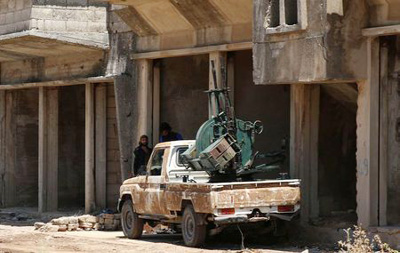
AFP, Beirut :
A ceasefire in southern Syria brokered by the United States, Russia and Jordan began at noon local time on Sunday, with a monitor reporting quiet in three southern provinces.
The ceasefire was announced on Friday by Russian Foreign Minister Sergei Lavrov and covers Daraa, Quneitra and Sweida provinces.
“The main fronts in the three provinces between regime forces and opposition factions have seen a cessation of hostilities and shelling since this morning, with the exception of a few scattered shells fired on Daraa city before noon,” said Rami Abdel Rahman, director of the Syrian Observatory for Human Rights monitor.
The Syrian regime had already announced its own unilateral ceasefire on Monday but fighting had continued on frontlines in the three provinces.
There has been no official comment from Syria’s government on the announcement, and there was no mention of the ceasefire on state television’s noon news bulletin.
The Al-Watan newspaper, which is close to the regime, quoted the head of Syria’s parliamentary Foreign Relations Committee suggesting that the agreement was negotiated in consultation with Damascus.
“No details on the agreement were presented, but the Syrian state has background on it,” the newspaper quoted Boutros Marjana as saying.
“The final word on adding southern Syria to the ‘de-escalation’ zones belongs to the Syrian state, and there is coordination with Russia on that,” he added.
The ceasefire in southern Syria comes in the wake of a deal inked in the Kazakh capital Astana in May between regime allies Russia and Iran and rebel backer Turkey to set up four “de-escalation” zones.
One of the mooted zones was in southern Syria, but the agreement has yet to go into effect as the three sides try to agree how the zones will be monitored.
On Friday, before the ceasefire deal was announced, a delegation of opposition factions that has attended talks in Astana expressed opposition to any ceasefire for just one part of the country.
In a statement, the factions said they were concerned about “secret meetings and understandings between Russia, Jordan and America on a deal for the south of Syria, separate from the north.” Such an agreement “would divide Syria, as well as the delegation and the opposition, in two.”
The ceasefire begins on the eve of fresh peace talks in Geneva scheduled to begin on Monday.
Expectations for the seventh round of UN-sponsored talks are low, but a UN official said Saturday that the ceasefire deal created positive momentum.
A ceasefire in southern Syria brokered by the United States, Russia and Jordan began at noon local time on Sunday, with a monitor reporting quiet in three southern provinces.
The ceasefire was announced on Friday by Russian Foreign Minister Sergei Lavrov and covers Daraa, Quneitra and Sweida provinces.
“The main fronts in the three provinces between regime forces and opposition factions have seen a cessation of hostilities and shelling since this morning, with the exception of a few scattered shells fired on Daraa city before noon,” said Rami Abdel Rahman, director of the Syrian Observatory for Human Rights monitor.
The Syrian regime had already announced its own unilateral ceasefire on Monday but fighting had continued on frontlines in the three provinces.
There has been no official comment from Syria’s government on the announcement, and there was no mention of the ceasefire on state television’s noon news bulletin.
The Al-Watan newspaper, which is close to the regime, quoted the head of Syria’s parliamentary Foreign Relations Committee suggesting that the agreement was negotiated in consultation with Damascus.
“No details on the agreement were presented, but the Syrian state has background on it,” the newspaper quoted Boutros Marjana as saying.
“The final word on adding southern Syria to the ‘de-escalation’ zones belongs to the Syrian state, and there is coordination with Russia on that,” he added.
The ceasefire in southern Syria comes in the wake of a deal inked in the Kazakh capital Astana in May between regime allies Russia and Iran and rebel backer Turkey to set up four “de-escalation” zones.
One of the mooted zones was in southern Syria, but the agreement has yet to go into effect as the three sides try to agree how the zones will be monitored.
On Friday, before the ceasefire deal was announced, a delegation of opposition factions that has attended talks in Astana expressed opposition to any ceasefire for just one part of the country.
In a statement, the factions said they were concerned about “secret meetings and understandings between Russia, Jordan and America on a deal for the south of Syria, separate from the north.” Such an agreement “would divide Syria, as well as the delegation and the opposition, in two.”
The ceasefire begins on the eve of fresh peace talks in Geneva scheduled to begin on Monday.
Expectations for the seventh round of UN-sponsored talks are low, but a UN official said Saturday that the ceasefire deal created positive momentum.

